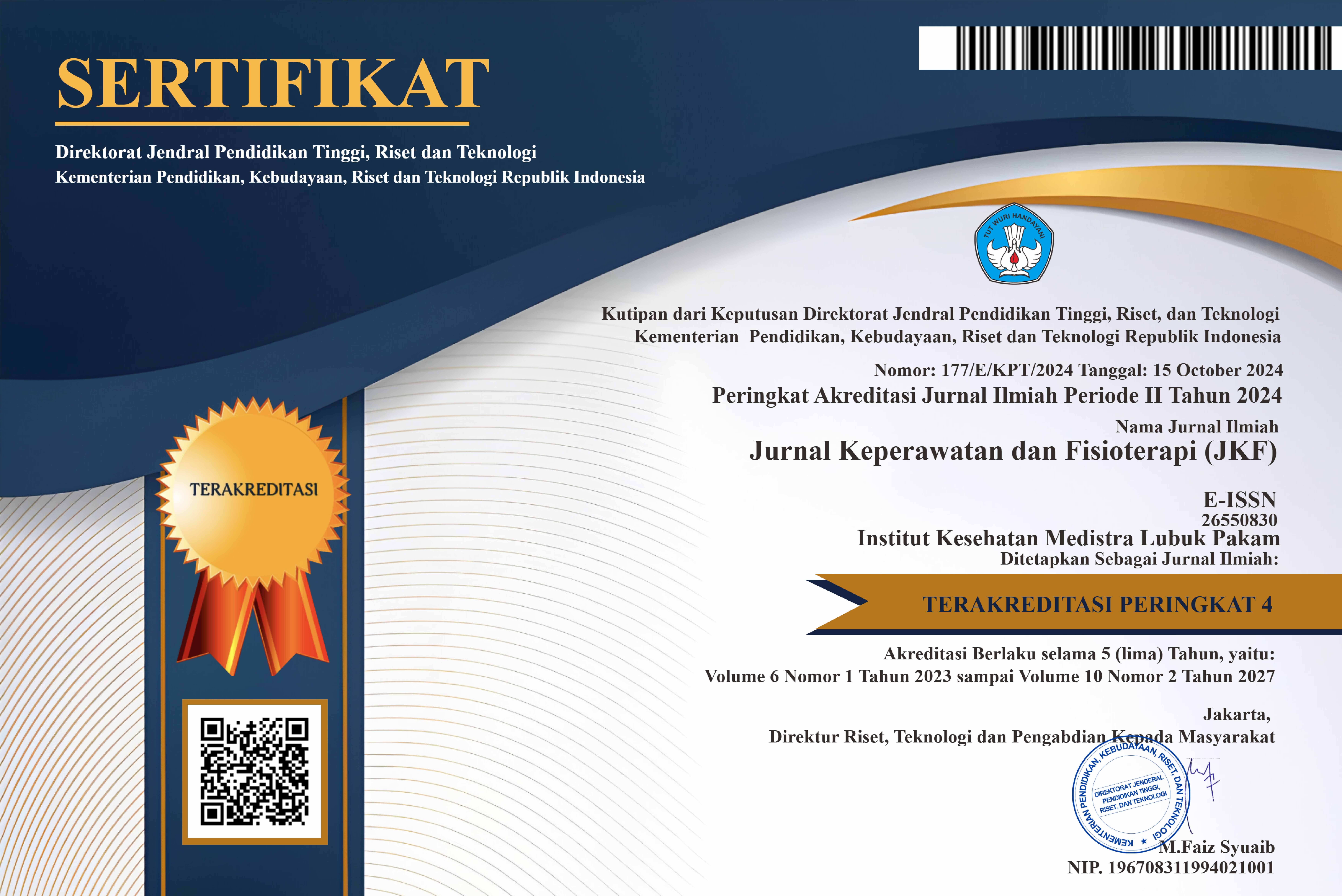Relationship between Perception with Nurse Anxiety Level about Covid-19 at RSU Karsa Husada Batu
DOI:
https://doi.org/10.35451/jkf.v4i2.980Keywords:
Perception, Anxiety Level, Nurse, Covid-19Abstract
The incidence of Covid-19 cases continues to increase from day to day so that health workers as the front line are increasingly stressed due to the increasing workload, worrying about their health, and families who have an impact on health workers will experience increased anxiety. The perception of health workers about COVID-19 is closely related to the level of anxiety. A positive perception of a disease will experience mild anxiety. A negative perception of a disease can also make the level of anxiety higher. The purpose of this study was to determine the relationship between perception and level of anxiety. The research design is quantitative analytic with a cross-sectional approach. Sampling using purposive sampling with a sample of 65 respondents. Data analysis using Pearson product moment correlation test. The results showed the significance value of perception with anxiety level was 0.084 (> 0.05). The results showed that there was no relationship between the perceptions of nurses at Karsa Husada Batu General Hospital about Covid-19 and anxiety. This is supported by nurses' perceptions of Covid-19 being in the moderate category, while nurses' anxiety about Covid-19 is in the moderate category. This means that nurses perceive Covid-19 as a flu that does not need to be feared. In addition, the high level of education and knowledge of nurses, the experience of nurses, the readiness of the Karsa Husada Batu Hospital in facing the maximum Covid-19 pandemic in the form of the application of 3M, the availability of adequate PPE greatly affects the perception and anxiety of nurses about COVID-19. For further researchers, it is hoped that they can conduct further research on the factors that can affect anxiety about Covid-19. It is also necessary to do similar research with other variables with additional measurements.
Downloads
References
Abna, I. M., Rahayu, S. T., Rizkyana, M., Fauziyah, D., Rohmah, I. T., & Sholihat, S. (2021). Edukasi masyarakat tentang pentingnya penerapan protokol kesehatan dan menjaga imunitas tubuh dalam rangka pencegahan corona virus disease (covid-19) di Desa Pesing Koneng Kedoya Utara Jakarta Barat. E-Amal: Jurnal Pengabdian Kepada Masyarakat, 1(2), 165-172.
Budiawati, A. T. (2014). Persepsi Perawat Terhadap Perawatan Odha Di Ruang Penyakit Dalam Rsud Banyumas (Doctoral dissertation, Universitas Muhammadiyah Purwokerto).
Cheng, Q., Liang, M., Li, Y., He, L., Guo, J., Fei, D., Zhang, Z. (2020). Correspondence Mental health care for medical staff in China during the COVID-19. Lancet, 7, 15–26. https:// doi.org/10.1016/S2215-0366(20)30078-X
Fadli, F., Safruddin, S., Ahmad, A. S., Sumbara, S., & Baharuddin, R. (2020). Faktor yang mempengaruhi kecemasan pada tenaga kesehatan dalam upaya pencegahan covid-19. Jurnal Pendidikan Keperawatan Indonesia, 57-65.
Ghufron, M. N., & Risnawita, R. (2014). TeoriTeori Psikologi. Jogjakarta: Ar- Ruzz Media
Giuliano, V. E. (1967). Additional references: Hamilton anxiety rating scale (HAM-A). Communications of the ACM, 10(6), 342. https://doi.org/10.1145/363332.363339
Henny Tambengi et al. (2019). Hubungan waktu tunggu dengan kecemasan pasien di unit gawat darurat di rumah sakit umum. Journal of Chemical Information and Modeling, 53(9), 1689–1699.
Hilmayani, I. N., Chusniyah, T., & Suhanti, I. (2021). Hubungan antara persepsi penyakit (illness perception) dengan distres psikologis pada penderita kanker di Kota Banjarmasin Kalimantan Selatan. Flourishing Journal, 1(4), 284-289.
Hursepuny, F. L., Eka, N. G. A., & Lumbantoruan, S. M. (2017). Professional quality of life in emergency and critical care nursing: a literature review. UI Proceedings on Health and Medicine, 2.
IASC. (2020). Catatan tentang aspek kesehatan jiwa dan psikososial wabah Covid-19 (pp. 1– 20).
Ismawati, N. D. S., Supriyanto, S., & Haksama, S. (2020). Hubungan Persepsi Petugas Kesehatan dengan Kepatuhan Terhadap Upaya Pencegahan Penyebaran Wabah Covid-19 di Area GBPT RSUD Dr. Soetomo. CoMPHI Journal: Community Medicine and Public Health of Indonesia Journal, 1(2), 101-108.
Lai, J., Ma, S., Wang, Y., Cai, Z., Hu, J., Wei, N., Li, R. (2020). Factors Associated With Mental Health Outcomes Among Health Care Workers Exposed to Coronavirus Disease 2019. JAMA, 3(3), 1–12. https://doi.org/ 10.1001/jamanetworkopen.2020.3976.
Li, Q., Guan, X., Wu, P., Wang, X., Zhou, L., Tong, Y., Feng, Z. (2020). Early Transmission Dynamics in Wuhan, China, of Novel Coronavirus–Infected Pneumonia. The New England Journal of Medicine, 382(13), 1199– 1207. https://doi.org/10.1056/NEJMoa2001316
Lockhart, S. L., Duggan, L. V., Wax, R. S., Saad, S., & Grocott, H. P. (2020). Personal protective equipment (PPE) for both anesthesiologists and other airway managers: principles and practice during the COVID-19 pandemic. Canadian Journal of Anesthesia/Journal canadien d'anesthésie, 67(8), 1005-1015.
Nursalam, N. (2016). Metodologi Penelitian Ilmu Keperawatan. Jakarta: Salemba Medika.
Phelan, L. A., Katz, R., & Gostin, L. O. (2020). The Novel Coronavirus Originating in Wuhan , China Challenges for Global Health Governance. JAMA, 323(8), 709–710. https:// doi.org/10.1001/jama. 2020.1097
Pratiwi, M. S. A., Yani, M. V. W., Putra, A. I. Y. D., Mardiana, I. W. G., Adnyana, I. K. A., Putri, N. M. M. G., ... & Setiawan, I. P. Y. (2020). Hubungan karakteristik individu terhadap perilaku mengenai covid-19 di desa gulingan, mengwi, bali. Jurnal Kesehatan, 13(2), 112-120.
Puspitasari, A. J., Heredia Jr, D., Gentry, M., Sawchuk, C., Theobald, B., Moore, W., ... & Schak, K. (2021). Rapid adoption and implementation of telehealth group psychotherapy during COVID 19: practical strategies and recommendations. Cognitive and Behavioral Practice, 28(4), 492-506.
Ramadhan, A. (2020). Vitalnya ketersediaan APD untuk melindungi tenaga kesehatan. Jakarta. Retrieved from https://www.antaranews.com/ berita/1411158/vitalnya-ketersediaan-apduntuk-melindungi-tenaga-kesehatan
Tahir, M. R., Rahman, U., & Nursalam, N. (2015). Pengaruh kecemasan dan kesulitan belajar matematika terhadap hasil belajar matematika pada siswa kelas X MA Negeri 1 Watampone Kabupaten Bone. MaPan: Jurnal Matematika dan Pembelajaran, 3(1), 86-102.
WHO. (2020a). Coronavirus disease 2019 (COVID-19)Situation Report –67.
Yunere, F., & Yaslina, Y. (2020, June). Hubungan Stigma Dengan Kecemasan Perawat Dalam Menghadapi Pandemi Covid-19.In Prosiding Seminar Kesehatan Perintis(Vol.3, No.1, pp.1-1)
Zhong, B. L., Luo, W., Li, H. M., Zhang, Q. Q., Liu, X. G., Li, W. T., & Li, Y. (2020). Knowledge, attitudes, and practices towards COVID-19 among Chinese residents during the rapid rise period of the COVID-19 outbreak: a quick online cross-sectional survey. International journal of biological sciences, 16(10), 1745.
Published
Issue
Section
License
Copyright in each article is the property of the Author.


























